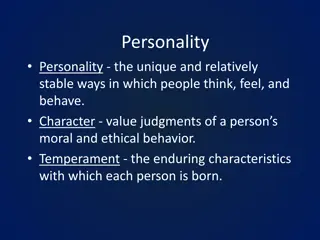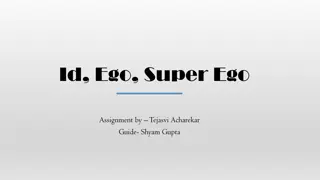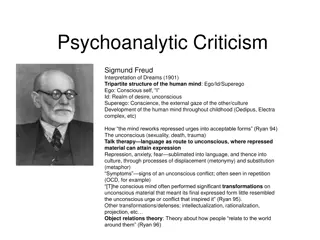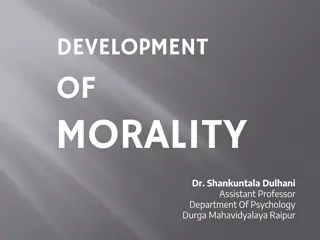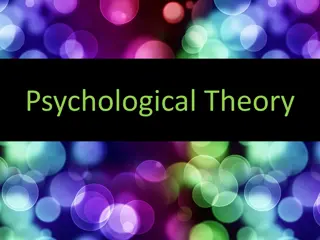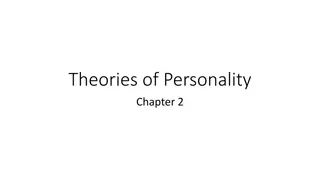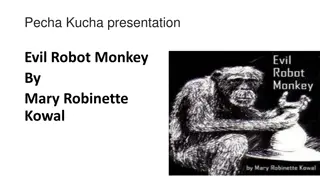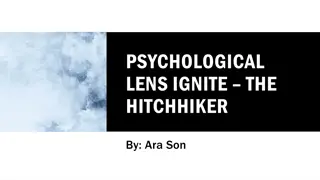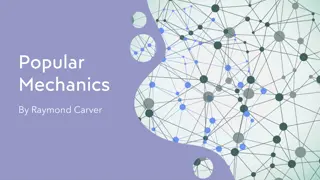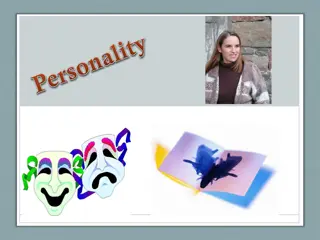Personality: Freud's Psychoanalytic Theory
Personality encompasses unique ways individuals think, feel, and behave. Sigmund Freud's psychoanalytic theory explores the divisions of consciousness, parts of personality (Id, Ego, Superego), and stages of personality development. Freud's theory delves into the role of unconscious thoughts, desire
7 views • 41 slides
Freud's Theory of Id, Ego, and Superego
Freud's psychoanalytic theory describes human personality as consisting of three elements - the id, ego, and superego. The id seeks immediate gratification, the superego represents internalized moral standards, and the ego mediates between them. A healthy balance among these components is crucial fo
0 views • 11 slides
Overview of Psychoanalytic Criticism and Object Relations Theory
Psychoanalytic Criticism, originating with Sigmund Freud and further developed by Melanie Klein and Jacques Lacan, explores the intricate workings of the human mind, delving into the tripartite structure of the ego, id, and superego. The theory encompasses concepts such as the interpretation of drea
0 views • 10 slides
Moral Development: Insights and Perspectives
Morality is the belief in right behavior accepted by society. It involves moral behavior, feelings, and judgments. Moral development evolves from childhood to adulthood, influenced by experiences and challenges. Freud's id, ego, and superego theory and Skinner's behaviorism contribute to our underst
0 views • 12 slides
Overview of Psychological Theory in Literature
Psychological theory in literature encompasses two critical viewpoints - one focusing solely on the text itself and the other on the author. The first approach delves into conflicts, characters, dream sequences, and symbols present in the work, revealing inner desires and conflicts within characters
0 views • 17 slides
Overview of Freud's Psychodynamic Theories of Personality
This content delves into Freud's psychodynamic theories of personality, highlighting the ID, Ego, and Superego as key components. It discusses how early childhood experiences shape adult personality, the functions of each structure, and how they interact to influence behavior. The concept of defense
0 views • 34 slides
Psychological Evolution in "Evil Robot Monkey" Presentation
Explore the psychological evolution of Sly, a chimpanzee, in Mary Robinette Kowal's short story "Evil Robot Monkey." Sly's journey transitions from the Id to the Superego and eventually to the Ego, showcasing innate instincts, reactions to external stimuli, and the development of personal identity.
0 views • 20 slides
Psychological Analysis of "The Hitchhiker" Short Story
Exploring the psychological aspects of the short story "The Hitchhiker" by Ara Son, this analysis delves into the characters' behaviors through the lenses of Id, Ego, and Superego. The driver's internal conflicts and decisions are dissected as he encounters a hitchhiker, leading to intriguing shifts
0 views • 7 slides
Analysis of Character Fluctuation in "Popular Mechanics" by Raymond Carver
Throughout "Popular Mechanics," the character of the Mother displays a significant fluctuation between ID, EGO, and SuperEgo. Initially exuding anger and harshness towards her leaving husband, she later calms down and handles situations more rationally. However, as the story progresses, her instinct
0 views • 9 slides
Dave's Holiday Turkey Dilemma
Dave, a middle-aged man, faces a hilarious predicament when tasked with cooking a Christmas turkey he forgot to buy. In his attempt to hide his mistake, he navigates between his primal instincts (ID), societal norms (SuperEgo), and rational decision-making (Ego) in a light-hearted narrative by Charl
0 views • 13 slides
The Transformation of Will Arblaster: A Western Tale
Will Arblaster, a young gentleman seeking adventure and money, evolves throughout the story as his Id clashes with his Superego. From initial conflict to climax and falling action, Will grapples with his choices and their impact on others. Ultimately, he undergoes a significant change, mediating bet
0 views • 9 slides
Personality: Theories and Perspectives
Personality is a dynamic psychological concept shaped by internal needs, cognitive processes, and external influences. Psychodynamic and humanistic theories offer insights into different aspects of personality, while clinical and social-cognitive perspectives contribute to our understanding. Freud's
0 views • 26 slides
